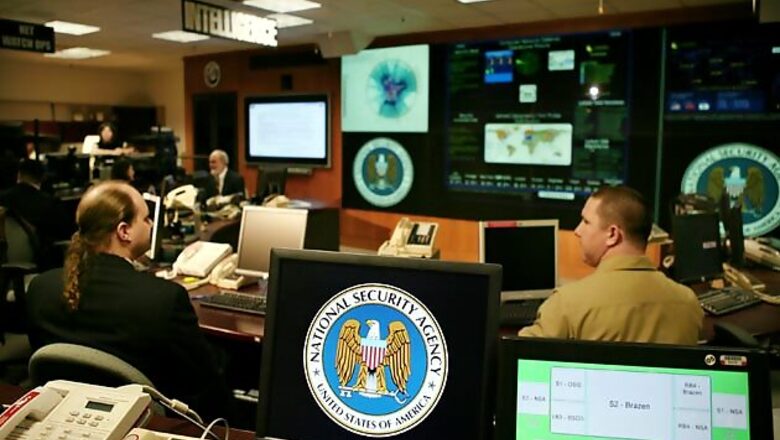
views
The National Security Agency may have unintentionally collected as many as 56,000 emails of Americans per year between 2008 and 2011 in a program that a secret US court subsequently said may have violated US law and the Constitution, according to documents released on Wednesday.
The once-classified documents were released by US intelligence agencies as part of an unprecedented White House effort to smooth the uproar following revelations by former contractor Edward Snowden about the extent of secret government surveillance programs.
US officials say the documents show that intelligence collection programs that inadvertently intrude on Americans' privacy are found and fixed.
But they also appear to raise new questions about operations by the eavesdropping National Security Agency and its oversight by the secret US Foreign Intelligence Surveillance Court (FISC).
"The court is troubled that the government's revelations regarding the NSA's acquisition of Internet transactions mark the third instance in less than three years in which the government has disclosed a substantial misrepresentation regarding the scope of a major collection program," Judge John Bates of the surveillance court wrote in one of the declassified documents.
More specifically, Bates said in an October 2011 ruling that the court had concluded that the process that resulted in improper collections of the tens of thousands of emails was "in some respects, deficient on statutory and constitutional grounds."
The newly declassified documents can be found at www.icontherecord.tumblr.com
'NOT AN EGREGIOUS OVERREACHING'
The emails in question represent only a small slice of the electronic communications scooped up around the world by the NSA. It targets about 250 million email communications for collection each year and, under a separate program, has captured and kept records of millions of phone calls by Americans.
According to the documents, only about 9 percent of the emails - or less than 25 million - are collected from "upstream" sources, which officials familiar with intelligence operations said are cable links belonging to telecommunications companies.
The rest are acquired by the NSA from Internet service providers at the point where they are sent or received. The roughly 56,000 annual emails in question were from "upstream" sources.
Intelligence officials, speaking on condition of anonymity, defended their practices.
"This is not an egregious overreaching by a greedy agency seeking to spy on Americans. This is a technological problem that resulted in an inadvertent collection of a relatively small number of US person communications," a senior intelligence official told reporters.
In the newly declassified ruling of the FISA Court, the court in a footnote estimates that, based on data supplied by the NSA, between 2008 and 2011, the agency might have unintentionally collected as many as 56,000 emailed communications of Americans annually.
US intelligence officials told reporters that the domestic emails were collected under a program designed to target the emails of foreign terrorism suspects.
The program does not collect emails because of flagged words such as "bomb." Instead it takes in those mentioning specific addresses, or going to or from particular addresses, one official said.
One way that emails of American citizens can get caught in the net is because the program captures the screenshot of the person's webmail account that shows a page of emails received or sent, rather than just the one targeted email, he said.
"For technological reasons NSA was not capable ... and still is not capable of breaking those down into their individual components," the official said.
'SELF-POLICING'
According to the officials and a court document which the administration released, the NSA decided to "purge" the material after discovering it was inadvertently collected.
"When you look at these documents taken as a whole, you'll get a sense for the really effective self-policing that goes on at NSA," an intelligence official said. "Any time you have a large technologically complex operation that involves thousands of people, there will mistakes, there will be errors."
The historically ultra-secretive NSA has recently taken rare steps to openly discuss classified surveillance programs after the Snowden disclosures put the Obama administration on the spot to try and explain that US intelligence agencies were not deliberately spying on Americans and foreign allies.
A handful of lawmakers, most notably Senator Ron Wyden, a Democratic member of the Senate Intelligence Committee, had begun complaining months ago that the NSA was eavesdropping on Americans' communications in ways that were excessive and not transparent.
Wyden, in a statement, said the declassification of the court ruling was "long overdue" and made clear that the law as written was "insufficient to adequately protect the civil liberties and privacy rights of law-abiding Americans and should be reformed."
Intelligence officials and the declassified documents explained that one of the main reasons that the NSA inadvertently collected information on Americans without proper legal authorization was that the method used to collect emails from targeted addresses linked to foreign suspects sometimes automatically brought into the agency batches of unrelated, and purely domestic, emails. Those should not have been collected without a warrant.
Since discovering the inadvertent collection program, intelligence officials said, the NSA has tightened its procedures for spotting and getting rid of data on Americans that was collected without proper authority.




















Comments
0 comment